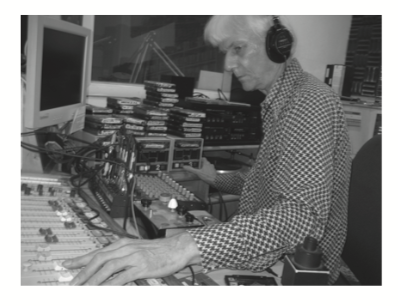“The Ambient Cannibal,” an episode of KPFA’s Thursday night program, Over the Edge, begins like all episodes of Over the Edge: with the song “Heaven and Hell” by Vangelis (a composer perhaps best known for his soundtracks to the films Blade Runner and Chariots of Fire). It opens with a soaring, wordless female vocal. It has those rich Vangelis synthesizer lines, a steadily building melody, and, eventually, low male vocals and a church bell. It’s so damn serious, has so much gravitas, that the listener assumes it has to be a joke. And it is—sort of.
The nebulous space between the straight-faced admission and the bald-faced lie, the real and the surreal, is the terrain of Over the Edge. It is also, by extension, the terrain of the Bay Area band/collage artists/media pranksters/copyright activist group Negativland, who, through the commitment of member Don Joyce, are responsible for Over the Edge. Joyce—who trained as a painter at the Rhode Island School of Design—became a member of Negativland after inviting the band to play on an early incarnation of Over the Edge, and it was his exposure to their collage techniques and creative, anything-goes approach that first got him thinking about the radio station as a “performative instrument.” The show became a lab, a place to try out material for records and performance. It also served as an outlet for narrative ideas, such as “Moonrock,” the serialized history of the band’s conjured mythology, and Don’s many on-air personae: Omar D. Edge; Dr. Oslow Norway, Dean of Psychiatric Broadcasting for the Universal Media Netweb; and C. Elliot Friday, the world’s richest man.
Episodes of Over the Edge revolve around a theme. In this case, it is a three-hour consideration of cannibalism—of the ritual, fictional, and audio variety. A Canadian anthropologist discusses cannibalism in the natives of the American Northwest; a whispering pirate DJ with a British accent plays odd, lo-fi punk rock that sounds like it’s been recorded by the DJ himself; the famously curmudgeonly author Harlan Ellison reads a disturbing—and brilliant—story about Jack the Ripper let loose in a futuristic city. All of it is set against a backdrop of ambient electronic music, much of it from DJ Spooky’s Necropolis: The Dialogic Project.
Over the Edge plays best at night. If you’re not in Berkeley at midnight on a Thursday, you will be rewarded if you take your recording of the show and wait until dark, until you are feeling the pull of sleep on your eyelids, before pressing play. Be warned, though: Joyce knows how to...
You have reached your article limit
Sign up for a digital subscription and continue reading all new issues, plus our entire archives, for just $1.50/month.
Already a subscriber? Sign in





